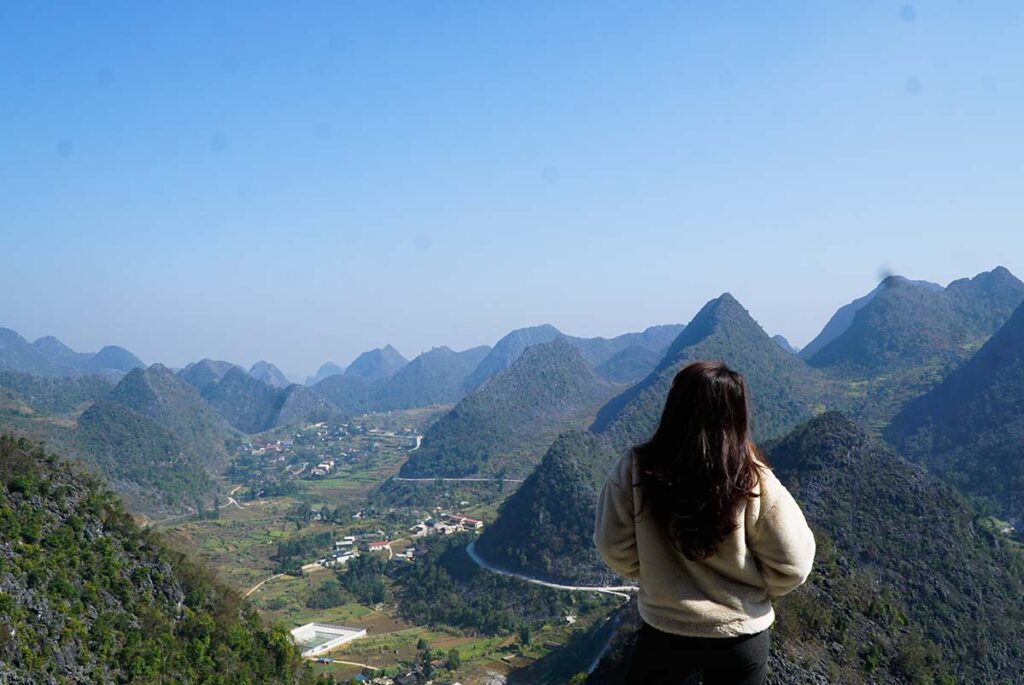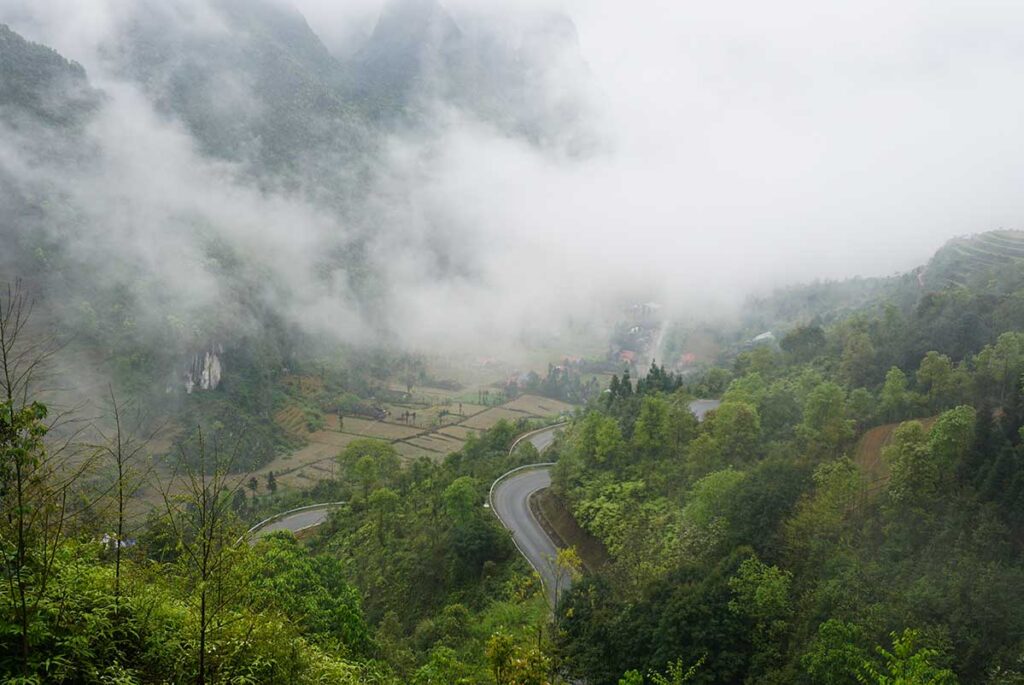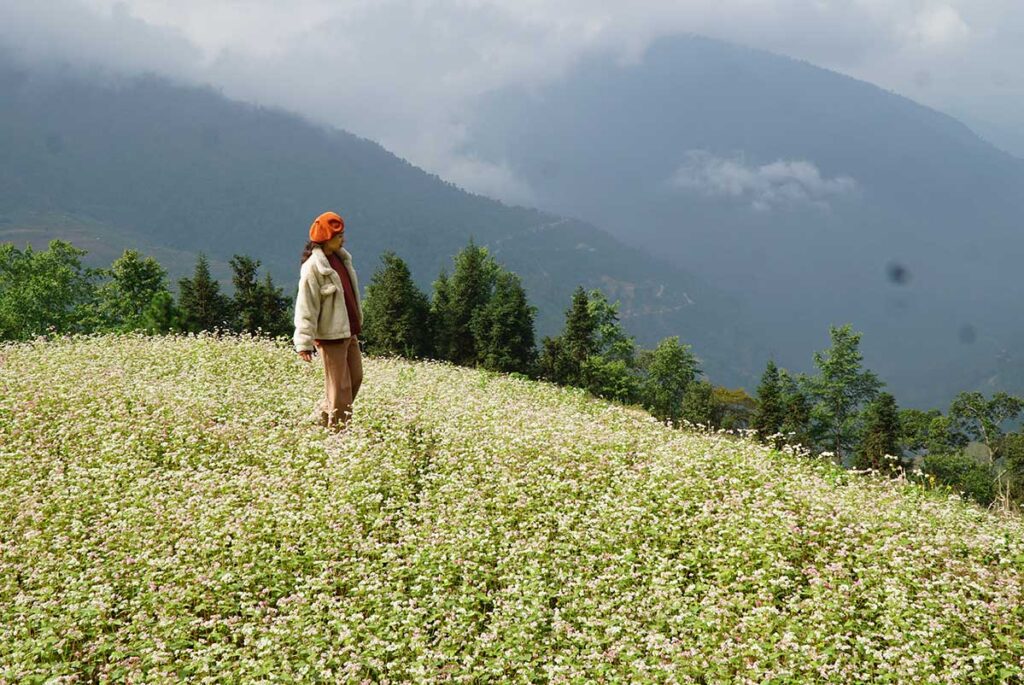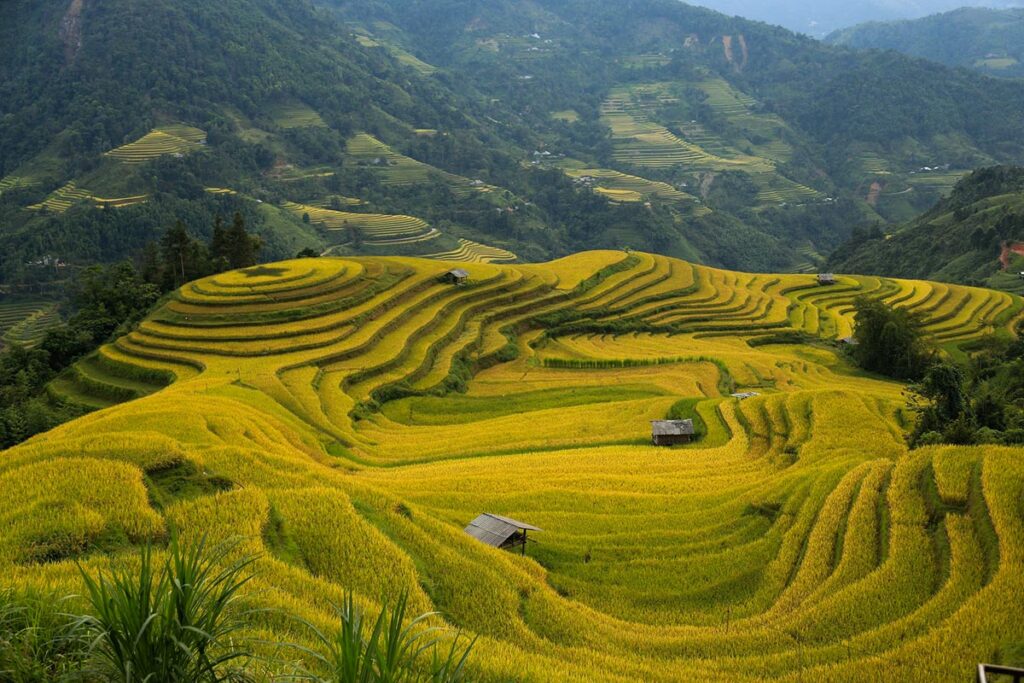Best time to visit Ha Giang
The best time to visit Ha Giang is during the months of October, November, March, April, and May. These months offer a great balance of less rainfall, clearer skies, and moderate temperatures. It’s the perfect time to explore Ha Giang’s stunning landscapes without the discomfort of extreme weather conditions.

If you don’t mind the cold, December to February can also be a good time to visit. There is very little rainfall these months, however you’ll have a higher chance of encountering foggy days.

Ha Giang seasons
Spring (March to May)
Spring in Ha Giang is characterized by mild temperatures and blooming flowers. It’s a beautiful time to visit, with lush green landscapes and pleasant weather.

Summer (June to August)
Summer brings warmer temperatures to Ha Giang, with some areas experiencing hot and humid weather. The countryside is vibrant and filled with rice terraces, but be prepared for occasional rainfall.
Autumn (September to November)
Autumn is considered the best season to visit Ha Giang. The weather is cooler and more comfortable, with clear skies and stunning landscapes. The rice terraces turn golden, creating picturesque scenery that attracts many travelers.

Winter (December to February)
Winter in Ha Giang can be cold, especially in the higher altitudes. Temperatures can drop below freezing in the mountainous areas. However, the winter landscape has its own charm, with misty mountains and a peaceful atmosphere.
Ha Giang weather per month
January
January is the coldest month in Ha Giang, with temperatures ranging from 8°C (46°F) to 16°C (61°F). It can be quite chilly, especially in the mountainous areas, and there may be occasional frost.
February
Similar to January, February remains cold in Ha Giang, with temperatures ranging from 10°C (50°F) to 18°C (64°F). There may still be occasional frost, but the weather starts to gradually warm up towards the end of the month.
March
March marks the beginning of spring in Ha Giang. Temperatures range from 12°C (54°F) to 22°C (72°F), and the weather becomes milder. It’s a good time to visit, with blooming flowers and pleasant weather.
April
In April, Ha Giang experiences mild temperatures, ranging from 15°C (59°F) to 25°C (77°F). The landscape becomes greener, and you can witness the beauty of the terraced rice fields.
May
May is a transition month into the summer season. Temperatures range from 18°C (64°F) to 28°C (82°F), and the weather starts to get warmer. It’s a great time to explore Ha Giang before the summer crowds arrive.
June
June marks the beginning of the summer season in Ha Giang. The temperatures range from 22°C (72°F) to 32°C (90°F). It is a warm and humid month with occasional showers, but the countryside is lush and vibrant.
July
July is one of the hottest months in Ha Giang, with temperatures ranging from 24°C (75°F) to 34°C (93°F). It is the peak of summer, and you can expect warm and sunny days. Showers are possible.
August
August continues to be hot and humid in Ha Giang. Temperatures range from 24°C (75°F) to 33°C (91°F). It is also the month with the highest chance of rainfall, including the possibility of typhoons. However, the landscapes are incredibly green and picturesque.
September
September marks the transition from summer to autumn in Ha Giang. Temperatures range from 22°C (72°F) to 31°C (88°F). It is a great time to visit as the rainfall decreases, and the weather becomes more pleasant. The countryside is still lush and beautiful.
October
October is considered one of the best months to visit Ha Giang. The temperatures range from 18°C (64°F) to 27°C (81°F). The weather is cooler, and the landscapes transform with the golden hues of the rice terraces. It’s a popular time for trekking and photography.
November
November brings cooler temperatures to Ha Giang, ranging from 14°C (57°F) to 23°C (73°F). It is a transition month into the winter season. The landscapes retain their beauty and clear skies. It’s a great time to explore Ha Giang before the cold sets in.
December
December brings colder temperatures to Ha Giang, ranging from 10°C (50°F) to 20°C (68°F). It can be chilly, especially in the higher altitudes, and there may be occasional rainfall.
Tips for visiting Ha Giang
1. Ha Giang is beautiful all year
Ha Giang is a destination of beauty throughout the year, offering stunning landscapes regardless of the weather conditions. There is no rice harvest season or perfect beach weather needed. Whether it’s cold or hot, wet or dry, Ha Giang never fails to captivate people with its charm and natural wonders.
2. Choosing the car

If you’re not keen on riding a motorbike during the rainy season or cold winter months, opting for a car is a practical choice. A car provides excellent protection from the elements, ensuring a comfortable and enjoyable journey through Ha Giang’s picturesque landscapes.
3. Packing tips
When packing for your trip to Ha Giang, it’s always a good idea to bring a light jacket. This handy piece of clothing can shield you from rain, keep you warm against chilly winds, and easily layer up or down depending on the weather. It’s also a handy item to protect yourself from the sun’s rays. And if you are not using it, you can easily store it in your bag.
Read all our tips in what to bring to Ha Giang.
4. Weather is hard to predict
Weather in the mountainous region of Ha Giang can be unpredictable, with clouds and rain often lingering between the peaks. Checking the weather forecast is helpful, but don’t be disheartened by the sight of rain on the forecast. It often signifies short-lived showers, occurring mainly in the mornings or evenings.
5. Embrace the weather
Embrace the weather and the unique experiences it brings. Even if the weather isn’t ideal, Ha Giang’s breathtaking scenery, rich ethnic cultures, and immersive experiences will make your journey truly unforgettable. Be prepared for different weather scenarios and embrace the adventure that awaits in Ha Giang.
FAQ about weather and best time to visit Ha Giang
When is rainy season in Ha Giang?
The rainy season in Ha Giang typically occurs from May to September. Among these months, July and August usually receive the most rainfall, while May and September tend to be drier but still experience occasional showers.
Can I still do the Ha Giang Loop during rainy season?
Yes, it is possible to do the Ha Giang Loop during the rainy season, but extra precautions are necessary. Wet roads can be slippery, and landslides, although infrequent, are a possibility. If you’re not an experienced motorbike driver, it’s best to go by car with driver or on the back of a motorbike with an experienced Easy Rider
What is the best time to do the Ha Giang Loop?
The best time to do the Ha Giang Loop is during the dry season, which runs from October to April. During these months, the weather is more predictable, and the roads are generally safer.
Can you do the Ha Giang Loop all year?
Yes, the Ha Giang Loop is accessible all year round. However, certain times, like during the rainy season, may pose more challenges and require extra caution.
Is Ha Giang cold in the winter?
Yes, Ha Giang can get quite cold in the winter, especially in December and January. Temperatures can drop to around 10°C (50°F) or even lower in the mountains.
What is the climate in Ha Giang?
Ha Giang has a tropical monsoon climate with two distinct seasons: the rainy season (May to September) and the dry season (October to April). The region can experience cold spells in the winter, especially in higher altitudes.
Can you do the Ha Giang Loop in the rain?
It’s possible, but you have to drive more carefully in heavy rain. Wet conditions make the roads slippery and increase the risk of landslides. If you do decide to venture out, ensure you have proper rain gear and drive cautiously.
Does it get cold on the Ha Giang Loop?
Yes, certain sections of the Ha Giang Loop, especially those at higher altitudes, can get quite chilly, particularly during the winter months. It’s a good idea to pack layers or warmer clothing if you’re traveling during this period.
Which month is best for Ha Giang?
October and November are often considered the best months to visit Ha Giang. During these months, the weather is generally pleasant, the landscapes are lush after the rainy season, and the terraced fields showcase vibrant colors, making for great photography.

